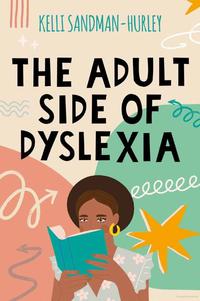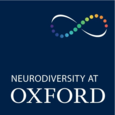The Adult Side of Dyslexia by Kelli Sandman-Hurley

Image: the book cover featuring the title and author's name, colourful squiggly and star shaped designs, and a drawing of a woman wearing a hat, floral top, and gold hoop earrings reading a book
Well dear spirited reader,
Where does one start... With, as Miranda Hart would say in her TV series “Miranda” - “Just Fun!”
Indeed, my jolly bookworm friends, “Just Fun”, “Hurrah”, I hear you cry… I did find this quite illuminating, and even now, see new things to learn and participate in, and general ways to mentor, advocate and help individuals succeed.. it’s about being proactive in the face, of the” we know better squad” (to them, I say Just “NO”)
The premise of the book is that of struggles, challenges, outlook, distrust of educational systems, the positive shine on the experience’s with dyslexia, how to succeed, and useful resources and tools to end with.
From Childhood to Adulthood.
The author says, in the preface:
“Words we use matter, the programs we use matter, the decisions about instruction matters and yes, spelling matters.”
The book, is arranged in a very concise way, for the reader to enjoy and pick the parts most pertinent to what they wish to focus on
The first chapter looks at the side of how the dyslexic person would describe dyslexia, from their childhood diagnosis for some of the individuals to adulthood now, with some undiagnosed individuals in the book to give a cross section and additional clarity to the read.
As not all dyslexics are diagnosed, some may feel they are dyslexic, or their child or family member is waiting for a dyslexia diagnosis. This chapter very much looks at the diagnostic settings and how these individuals at times either were or weren’t diagnosed and the impact that having dyslexia had on them, their siblings, and other family members, and some of the feelings of individuals.
“Making sure voices were heard”, The author points to the book being simple: “It’s just about listening”.
Whilst I do concur – it is , it is however more than just listening, it’s a rally cry, to educators, local authorities, council men, women, individuals, people, and society as a whole to stand up and take notice.
By eliminating wrong practises and things that don’t consider the individual’s cognitive challenges that take place every day, and the wider impact.
Indeed, the book is spliced with paperclip bubbles, which reiterate what the author thought were the right points to emphasise. My feelings are, she also learnt a lot by writing it, and certainly put forward everyone’s story with compassion and a focus on their words, their feelings, the impact on them, and others they knew.
The speech bubbles of the individual’s words and what they felt were most important within the book, and rightly so, placing the emphasis on them.
In chapter 1 – I see many differing words that the individuals used, which if I’m honest, made me stand still, and reflect on my own bias although unconscious when I was a lot younger… made me reflect a lot more even now, about how “cruel” peers, family members and the adults whom you’re meant to look up, to “the educators”, think. The author at one point in chapter 1 asked respondents to name one word to describe dyslexia: what came back was a commonality in words, with many suffering in silence, be they young or old, due to the remaining “stigma” around the word “Dys-“ and how very self-conscious the individuals are and were. The commonality of the Description of “the experience” rather than the symptomology or diagnostics of the challenges they face shone through.
Some of the words used like laborious, slow, nightmare, cry, stupid, and struggle had very negative connotations… However, this is their reality and this must not be taken with a pinch of salt.
Chapter 2 focused on how no one helped individuals who struggled and fell through the cracks of education- worrying about how this could impact individuals’ families, personal stories about shame, embarrassment, and how it can manifest into anger, frustration and even self-medication. The author discusses Maslow’s hierarchy of needs, that everyone needs to feel a sense of belonging, and feeling safe, and this was not the case for most adults interviewed., The feeling of losing hope about one’s ability to attain (esteem), and the depletion of their ability to develop their own potential. Before dealing with the dyslexia (and addressing the person’s reading and writing skills), the author emphasises, dealing with the emotional side of the person via intervention was important, as if you can’t address the feelings then how can you tackle the outer or educational feelings. Which indeed, causes room for thought.
If you don’t have the right programs, interventions, or approach how can you deal with the core issues with the student, adults likewise? Creating a distrust of education and the educational system, within this a hesitancy to return to education.
Chapter 3 looks at dyslexia-induced distrust. One individual describe experiencing “ years of bullying” and “went to a “special” class for stupid people!”. Although his reality is harsh and disrespectful at the least, this was what it was like within the educational system. The individual states “ So, many people wish they could go back and do it again, I wish I could go back and never make it happen”.
This heartfelt plea: why, what, and when would they help, or wouldn’t help , is indeed beyond words. Classroom struggles like the curse of “Reading out loud” leading to torment, isolation or intense bullying, just due to not being understood, acknowledged, or even ASKED!, lead to unfilled aspirations, and low self-esteem and self-worth, which lead to trauma, frustration, and anger. To the point that the author states that:
“More than one adult shared that they decided not to have children because they didn’t want to pass on their dyslexia. Although the adults who shared this with the author seem to be on the severe end of dyslexia”
Reading this, made my heart just stop, alas writing the above sentence fills me with a lot of sadness, that these individuals felt like this. A part of me wants to “scream” at the educational, social, and other settings for putting the individuals through this.. can I say I’m angry about this and how dare they .. Well, I just did.. incensed that individuals feel that they can’t bring joy into their lives because of prejudice. One must stop really, it is quite upsetting, however again this is the reality of the emotional psychological impact of prejudice that can be felt from in childhood and through to adulthood. So, my point how can this be addressed, and why did it happen in the first place?
Chapter 4 talks about traumatic teaching practices and tutoring using the Orton-Gillingham approach; I know not of this method. This method according to the author, and no doubt her discussion is well researched, involves the “teaching of spelling and reading that is multisensory, explicit, and systematic. It teaches the student in a small group or 121 setting the underlying structure of the English language”., Even to the point that one individual that was in a private school was withheld accommodations. However, once a senior this person became a disability activist and listened to other dyslexics talk.
Chapter 5 focused on spelling and is it important to you.. whereby the author advocated and sat in on a education lead intervention whereby, the school seemed to think spelling wasn’t important as “ especially with all the technology and spellcheck” there’s no need. Only to realise that not everyone in the room could spell, spellcheck doesn’t pick up certain mistakes, moreover the author found that the school didn't know how to teach spelling, and decided it was okay if someone was partially illiterate. The mind boggles at this scenario.. Nobody asked the child or adult “would you like to spell?”, as if that person was irrelevant to the conversation.
Again, the author stated “the importance of spelling , it seems we haven’t asked those with dyslexia if they think it’s important. But I did.”
Chapter 6 – tackles dyslexia as a gift – Do you think dyslexia is a gift? A tricky question, the author states, and I concur as a gift pertains to something for free without payment or financial gain, or a natural ability or talent: to endow someone with something. The list seems endless, but overall a gift is generally in a certain context and light positive. A good point made by the author is “we may be appealing to some people, whilst alienating others”, time for a pause dear delightful reader for contemplation. Those, as stated, “thinking it is a gift, work harder, and find workarounds to improve their skills, as children no, however as adults they could only retrospectively though.” The author muses over the offering of “ Dyslexia is a hurdle, an obstacle, and obstacles are met to be cleared.” I find myself agreeing, dear reader, putting a positive spin on such “a pain in the derriere/ gluteus maximus”.
Chapter 7 looks at Has dyslexia affected your ability to succeed, one individual stated that his school experience was “trying to figure out what was “wrong” with him.”, finally diagnosed as a teenager, getting some support. Although athletic, he was dropped because at college his grades dived, was traumatized. The individual got it at the workplace as well, felt belittled, resigned, and got a better paid job. I then heard a scream of yes, yes, yes.. you didn’t take that rubbish lying down.. I stood up and said I’m worth more and am more *punching the air, in delight*.
The final Chapter looks at Acknowledge, Advocate, and Accommodate, how they can teach younger individuals who are currently struggling.
Parents - Be inquisitive, ask questions, do not wait for the red flags , pursue, and ask for screening at kindergarten (nursery). Do not give up, you’re not to blame.
Educators- advocate and acknowledge the struggles, the efforts, speak their language, don’t talk down to them, use empathy. Employ dyslexia mentors to help, advise and give guidance.
For adults, “Take that seat at the Table”: don't let anyone say that you can’t, or don’t deserve to be there. Share your story, you will inspire people.
Finally, dear jovial reader, with inspiring words, emotions and those struggling.. you’re NOT ALONE. With the right person, right outlook, right guidance, you can do it. My neurodivergent friends, be mindful though, even the best of us makes mistakes, get things wrong.. be that individual who inspires, by the words, the actions, the behaviours… facilitate kindness, empathy, and compassion, don’t give upon your dreams, be that individual who cares, make lifelong friends, and colleagues… as you never know that one person who you think “wont help, or understand” may indeed, understand the best, through their own experiences .. you never know where it may lead..
If I could give you all one piece of advice.. to everyone, it would dear reader start with one word, and alas combine into one sentence.. have a think, populate, muse.. as you will through life.. please do dear fellow reader think one the word or sentence ..
“ASK!” – “ASK!, really, no, really.. ASK!
In his talk series, 'What You Aut to Know', Colin Larkworthy, from the Nuffield Department of Medicine, shares his personal experiences and insights of living and working with Autism. He received a diagnosis of autism later in life and will share his journey "through the minefield of knowing you were unlike your peers, to finally being believed and finding somewhere you feel at home.“ Colin is an NDM Mental Health Ally and a mentor for the Neurodiversity Project.



